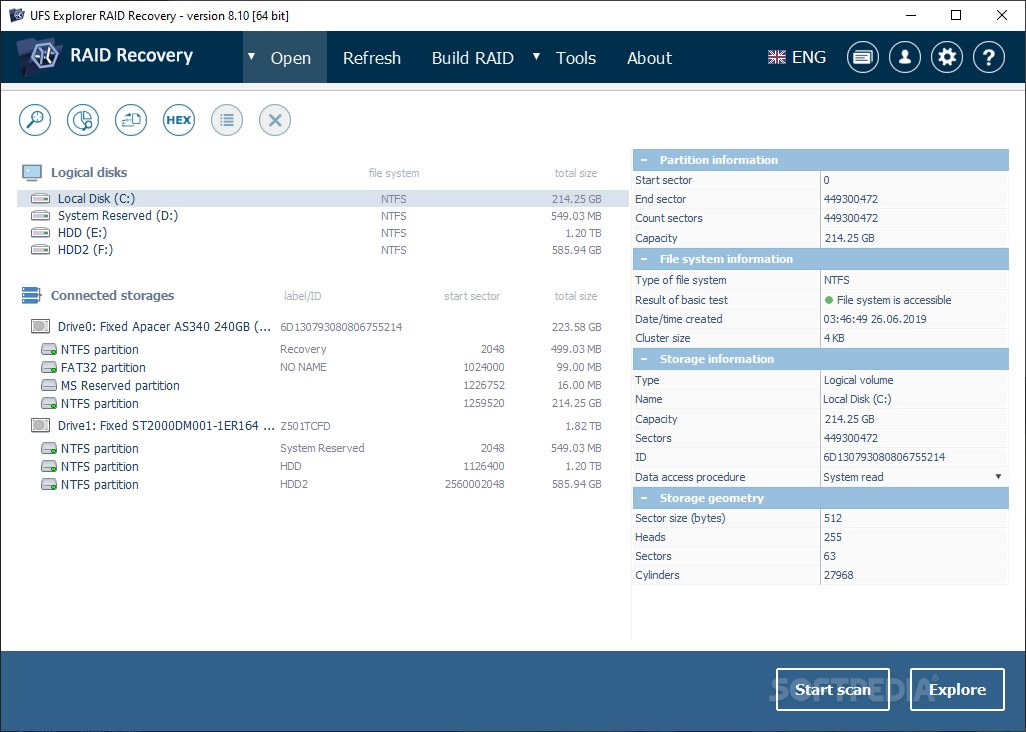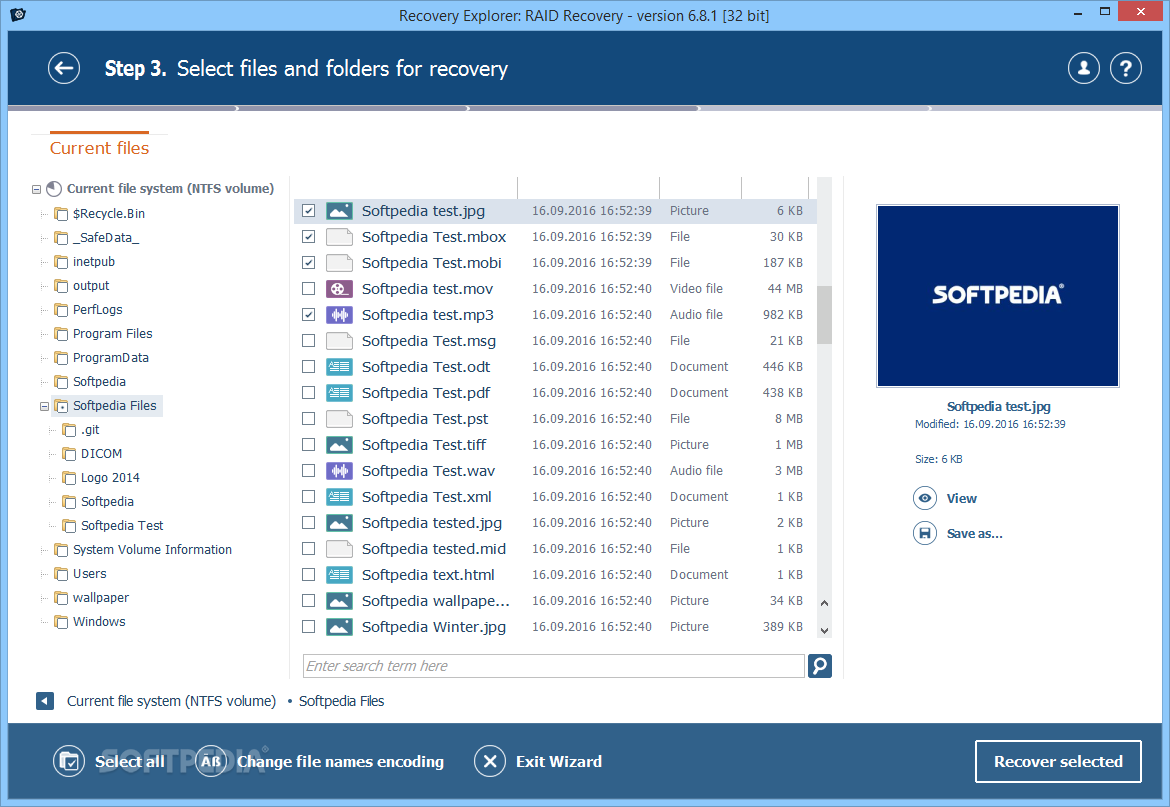Recovery Explorer offers comprehensive software tools for DIY data recovery from Windows, macOS and Linux that will easily cope with almost any case of data loss. Whether you are a novice user, data recovery pro or just want to retrieve your files from a RAID. Recovery Explorer RAID is a data recovery utility that is primarily meant to handle data loss from various RAID storages, but can be used for regular recovery operations as well. The software can access and recover lost data from the file systems of Microsoft Windows (FAT/FAT32/ExFAT/ NTFS), macOS (APFS, HFS+), Linux (Ext2/Ext3/Ext4, UFS/UFS2. Recovery Explorer RAID 15% Off Coupon 2021 (100% Working) Recovery Explorer RAID. Activate Coupon B2. To make sure the best experience on our website, ColorMango will use your cookie. Learn about Privacy Policy. Giveaway & Discounts, save over $5 million for more than 400,000 users. Recovery Explorer RAID is a data recovery utility that is primarily meant to handle data loss from various RAID storages, but can be used for regular recovery operations as well. UFS Explorer RAID Recovery is a versatile software instrument focusing particularly on data recovery from RAID and various RAID-based storages, like NAS and DAS. The program is capable of processing standard, nested and custom RAID patterns just as efficiently as individual disks and other electronic media, including USB flash drives and memory cards managed by various file systems of Windows.
- Recovery Explorer Pro
- Recovery Explorer Raider
- Recovery Explorer Raids
- Recovery Explorer Raiders
- Recovery Explorer Raid Crack
- Ufs Explorer Raid Recovery Crack
- For home user

- Windows
UFS Explorer RAID Recovery is particularly intended for reconstruction of RAID storages. The software covers standard and nested RAID configurations and allows assembling RAID storages from a set of virtual disks or disk images. After assembly, the RAID storage becomes available for data recovery tools in the program. Although primarily designed for complex devices, the RAID Recovery handles other storages with equal efficiency.
The software contains RAID Builder, an instrument for assembling storages based on RAID technology. The instrument allows reconstructing standard Levels 0, 3, 5, 6 and JBOD as well as nested Levels 50 and 60.
The software works with virtual environment as efficiently as with hardware. Therefore, assembly of RAID storages from a set of virtual disks and disk image files is also possible with this tool.
The embedded RAID Builder is an ideal tool for NAS recovery. The software recognizes RAID metadata on NAS drives and suggests reconstructing RAID configuration automatically. Supported NAS models include the most popular devices such as Buffalo Technology (TeraStation, LinkStation), Iomega, Synology, Intel, etc.
UFS Explorer RAID Recovery allows viewing contents of disks, disk partitions and files in hexadecimal mode. The in-built hexadecimal viewer may be helpful in defining RAID parameters such as drives order, parity distribution algorithm as well as in examination of the overall disk consistency.
Recovery Explorer Pro
The utility is able to recover backups created with the Apple software Time Machine, a default backup application included with macOS. UFS Explorer provides recovery of backups lost due to deletion of old backups, issues with the macOS version or the external disk error. With support of file links the software provides complete recovery results.
Beside RAID, the software deals with all types of other data storages, such as hard drives and USB storages, virtual disks and disk images. You can apply this full-featured program to any other device if it happens to undergo the data loss problem.
NTFS, FAT/FAT32, exFAT;
XFS, Linux JFS, Ext2-Ext4, ReiserFS;
Apple HFS+;
UFS/UFS2, big-endian UFS;
NTFS:
full support: data access, search for lost partitions, RAID recovery, recovery of deleted files, recovery after formatting and file system damage.FAT/FAT32/exFAT:
full support: data access, search for lost partitions, recovery of deleted files, recovery after formatting and file system damage.XFS:
full support: data access, search for lost partitions, RAID recovery, recovery of deleted files, recovery after formatting and file system damage. Support of NAS devices and custom servers.Apple HFS+:
full support: data access, search for lost partitions, RAID recovery, recovery of deleted files*, recovery after file system damage.Linux JFS:
full support: data access, search for lost partitions, RAID recovery, recovery of deleted files, recovery after formatting and file system damage.Ext2-Ext4:
full support: data access, search for lost partitions, RAID recovery, recovery of deleted files*, recovery after file system damage. Support of both NAS and custom servers.Edge browser slow startup. ReiserFS:
full support: data access, search for lost partitions, RAID recovery, recovery of deleted files, recovery after formatting and file system damage.UFS/UFS2:
data access, search for lost partitions, RAID recovery for both little-endian and big-endian variations. Recovery after file system damage. Very limited recovery of deleted files.
Automatic reconstruction of mdadm, LVM, Apple Software RAID, Intel Matrix;
Supported are most popular standard RAID patterns for RAID0, RAID1E, RAID3, RAID5, RAID6, RAID7, etc.;
RAID-on-RAID support: RAID level 10, 50, 60, 50E, etc.;
Supported are custom RAID patterns via RDL or Runtime VIM.
The software will copy files with the size below 768 KB only;
'Save' function of certain hexadecimal viewer/editor dialogs is disabled. Evernote you cannot sign in at the moment.
Microsoft Windows ®: starting with Windows ® XP with Service Pack 3 and later;
macOS: all versions starting with 10.7 and above;
Linux: Debian Linux 6.0 (or compatible) and above.
Intel Architecture, 32-bit (IA-32, x86);
AMD64 (x86-64).
any of supported operating systems;
at least 20 MB of free space on the disk for software executable files;
at least 1 GB of RAM;
Linux software version can run from most modern Linux Live CD.

64-bit edition of any of supported operating systems;
over 1 GB of free space on the disk for the program and temporary files;
at least 2 GB of RAM and 4 logical cores CPU;
default web browser.
Recovery Explorer RAID (Windows) 6.14.2
SysDev Laboratories LLC in Utilities File & Disk Management
Recovery Explorer Raider
Recovery Explorer RAID is an efficient software application for data recovery from Windows, Linux and macOS file systems which also provides advanced tools for restoring lost files from RAID systems of different configurations.
Recovery Explorer Raids
Recovery Explorer RAID is a data recovery utility that is primarily meant to handle data loss from various RAID storages, but can be used for regular recovery operations as well.
The software can access and recover lost data from the file systems of Microsoft Windows (FAT/FAT32/ExFAT/ NTFS), macOS (APFS, HFS+), Linux (Ext2/Ext3/Ext4, UFS/UFS2, XFS, Reiser, JFS), as well as Btrfs file system. The application recognizes and reconstructs various RAID configurations – standard levels RAID 0, 1, 3, 4, 5, 6 and JBOD as well as nested levels such as 50, 60, 10, 1+0 and custom RAID setups. Moreover, data can be recovered from Apple's Time Machine backups with the support of file links.
The additional features of the software include an inbuilt editor for building up a user-defined configuration using RAID Definition Language, an embedded RAID Builder to for performing NAS recovery, the option of automated RAID assembly as well as context disk analysis in the hexadecimal mode.
Along with a diversity of different RAID configurations common for NAS storages and supported by Recovery Explorer RAID, the program works with a wide range of NAS devices.
The general recovery procedure is performed in the following steps: optional storage scan, automatic or manual storage analysis, choosing the files for recovery and the recovery process itself. The speed of performance depends greatly on both the memory capacity of the storage and the size of files to be recovered.
The software has several licensing options depending on the purpose of use: from the free Trial License with the limitations on the size of files to be saved to the Personal, Business and Commercial licenses.
Recovery Explorer RAID (Windows) 6.14.2 File & Disk Management software developed by SysDev Laboratories LLC. The license of this file & disk management software is shareware$, the price is 119.95, you can free download and get a free trial before you buy a registration or license. Do not use illegal warez version, crack, serial numbers, registration codes, pirate key for this file & disk management software Recovery Explorer RAID (Windows). If you want to get a full and unlimited version of Recovery Explorer RAID (Windows), you should buy from original publisher SysDev Laboratories LLC.
Recovery Explorer Raiders
File Size: 8.02MB License: SharewarePrice: $119.95
Recovery Explorer Raid Crack
Related:Lost Data Recovery - NAS Data Recovery - Data Recovery Software - Data Recovery Raid - Data Recovery WizardData Nas Recovery - Raid Data Recovery - Data Raid Recovery - Data Linux Raid Recovery - Raid Data Recovery File - Data Raid Recovery Word - Raid Data Recovery Easy - Data Lost Recovery - Data Recovery Software - Software Data Recovery -
Platform: Win2000,Win7 x32,Win7 x64,WinOther,WinVista,Windows XP,WinServer,Other
System Requirements: Bradley whitford twitter. At least 20MB free disk space for software executable files; at least 1GB RAM.

Ufs Explorer Raid Recovery Crack
Downloads: 13 Category: Utilities File & Disk Management
